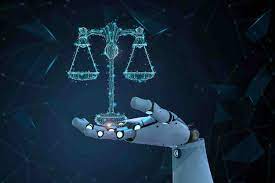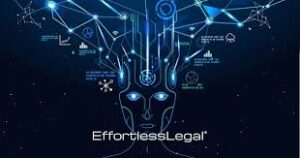The Legal Industry Transformed: The Benefits of AI-Powered Legal Support
The legal industry is undergoing a significant transformation with the integration of artificial intelligence (AI) technologies. AI has the potential to revolutionize the way legal professionals work, providing new opportunities for lawyers, law firms, and clients alike. In this article, we will explore the benefits of AI-powered legal support and how it is changing the future of the legal industry.
AI in Legal Research
One of the significant benefits of AI in the legal industry is legal research. AI-powered legal research tools, such as ROSS Intelligence and LexisNexis, can analyze vast amounts of legal documents and provide insights into case law, statutes, and regulations. This helps lawyers to save time and effort in their research, providing them with a starting point for their legal analysis.
Moreover, AI can be used to identify patterns and trends in legal data, providing lawyers with insights into legal issues and potential outcomes. This analysis can help lawyers to develop more effective legal strategies and arguments, improving their chances of success in the courtroom.
AI in Contract Review
AI can also be used in contract review and analysis. AI-powered contract review tools, such as Kira Systems and Seal, can analyze contracts and identify potential legal issues, such as inconsistencies and omissions. This helps lawyers to save time and effort in their contract review, providing them with a more accurate and comprehensive analysis of the contract.

Moreover, AI can be used to extract and classify data from contracts, such as clauses, terms, and obligations. This data can be used to create standardized contract templates and improve contract management processes, providing more efficient and effective legal operations.
AI in Legal Prediction
AI can also be used to predict legal outcomes and potential risks. AI-powered legal prediction tools, such as Premonition and Lex Machina, can analyze legal data to identify patterns and trends in legal cases, providing insights into potential outcomes and risks. This analysis can help lawyers to develop more effective legal strategies and make more informed decisions about legal cases.
Moreover, AI can be used to identify potential conflicts of interest and ethical issues in legal cases, helping lawyers to avoid potential legal and reputational risks.
Benefits of AI-Powered Legal Support
The integration of AI technologies in the legal industry provides several benefits for lawyers, law firms, and clients alike. Some of the key benefits include:
Increased Efficiency: AI can help lawyers to save time and effort in legal research, contract review, and legal prediction, providing them with more efficient legal operations.
More Accurate and Comprehensive Analysis: AI can provide a more accurate and comprehensive analysis of legal data, providing lawyers with insights into legal issues and potential outcomes.
Improved Legal Operations: AI can help to standardize contract templates and improve contract management processes, providing more efficient and effective legal operations.
More Informed Decisions: AI can provide lawyers with insights into potential legal and reputational risks, helping them to make more informed decisions about legal cases.
Better Client Service: AI can help lawyers to provide more efficient and effective legal services to their clients, improving client satisfaction and retention.
Conclusion
The integration of AI technologies in the legal industry has brought several benefits and opportunities for lawyers, law firms, and clients. AI has the potential to revolutionize the way legal professionals work, providing new avenues for legal research, contract review, legal prediction, and client service.
As we move forward, it is essential to ensure that we use AI responsibly and ethically in the legal industry. This can be achieved through the development of ethical guidelines and regulations for the use of AI in law, as well as through increased transparency and accountability in the development and deployment of AI technologies.
The integration of AI technologies in the legal industry is a game-changer, providing new and exciting opportunities for all those involved. The legal industry will continue to evolve and transform with the help of AI, providing us with new and innovative ways to provide legal services. As we move forward, it is essential to ensure that we use AI responsibly and ethically to uphold social and ethical values while harnessing the power of AI to revolutionize the legal industry.

However, there are also concerns about the use of AI in the legal industry. Some argue that the use of AI-powered legal support can lead to a depersonalization of legal services, reducing the role of lawyers in the legal process. Moreover, the use of AI in legal prediction raises concerns about the potential bias and inaccuracies in AI algorithms.
To address these concerns, it is essential to ensure that AI technologies are used responsibly and ethically in the legal industry. This can be achieved through the development of ethical guidelines and regulations for the use of AI in law, as well as through increased transparency and accountability in the development and deployment of AI technologies.
In addition, it is crucial to recognize that AI is not a replacement for lawyers but rather a tool to support them in their legal work. AI can provide lawyers with insights into legal issues and potential outcomes, helping them to develop more effective legal strategies and arguments. Moreover, AI can help lawyers to save time and effort in legal research and contract review, allowing them to focus on more personalized legal services and client support.
The integration of AI technologies in the legal industry has brought several benefits and opportunities for lawyers, law firms, and clients alike. AI has the potential to revolutionize the way legal professionals work, providing new avenues for legal research, contract review, legal prediction, and client service. However, it is crucial to ensure that AI technologies are used responsibly and ethically to address concerns about the depersonalization of legal services and potential bias in AI algorithms. By doing so, we can harness the power of AI to revolutionize the legal industry while upholding social and ethical values.
Furthermore, AI technologies have the potential to increase access to justice and improve legal services for underserved communities. AI-powered legal support can provide access to legal information and services for individuals who might not have access to traditional legal resources, such as low-income communities and rural areas. Moreover, AI-powered translation tools can help individuals who speak different languages to communicate and access legal services, promoting cultural diversity and inclusivity in the legal industry.
AI can help to address the issue of legal affordability. AI-powered legal support can provide more efficient and cost-effective legal services, reducing the cost of legal services for clients. Moreover, AI can help to standardize legal processes and procedures, reducing the time and effort required for legal work and increasing the affordability of legal services.
The integration of AI technologies in the legal industry is still in its early stages, and we can expect to see more advancements and innovation in the future. For instance, AI can be used to develop virtual legal assistants that can provide personalized legal services and support to clients. Moreover, AI can be used to create virtual courtrooms and online dispute resolution systems, providing more efficient and accessible legal services.
The integration of AI technologies in the legal industry has brought several benefits and opportunities for lawyers, law firms, and clients. AI has the potential to revolutionize the way legal professionals work, providing new avenues for legal research, contract review, legal prediction, client service, access to justice, and legal affordability. As we move forward, it is essential to ensure that we use AI responsibly and ethically to address concerns about the depersonalization of legal services, potential bias in AI algorithms, and its affordability. By doing so, we can harness the power of AI to revolutionize the legal industry while upholding social and ethical values.





















